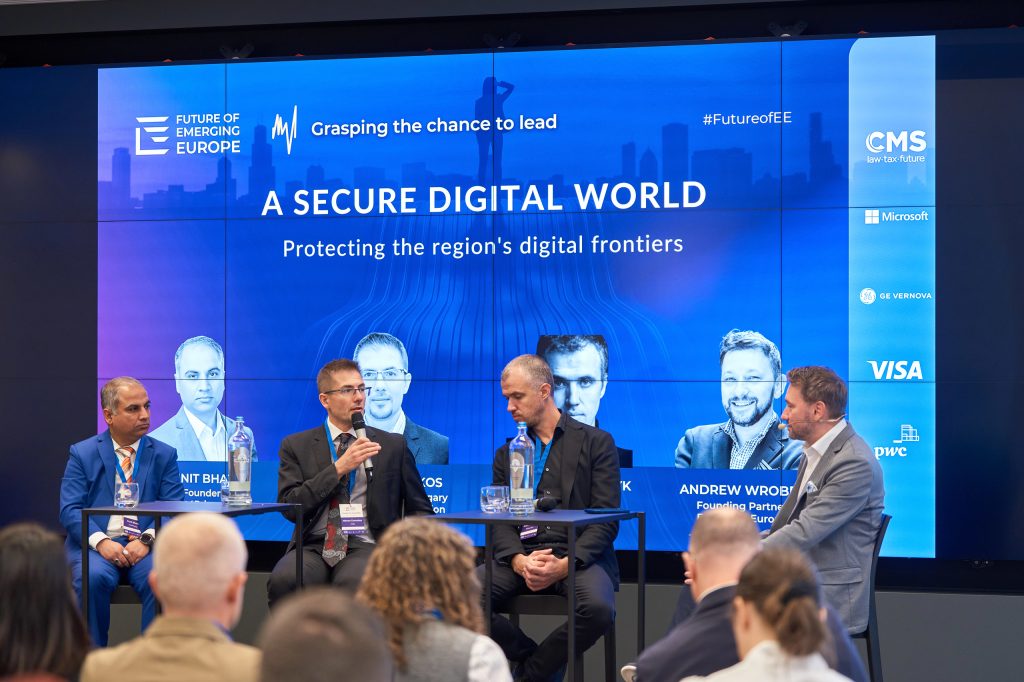Amid a challenging geopolitical climate, digital threats are becoming increasingly sophisticated and prevalent. Central and Eastern Europe is not immune to these challenges and must take proactive steps to protect its digital frontiers.
Over the past ten years, as the region’s economies and societies have been swept by digital transformation, the cybersecurity landscape in Central and Eastern Europe has rapidly changed. As more activities and data move online, people and organisations must now contend with a complex danger landscape.
The increasing sophistication of cyberattacks is one of the primary obstacles. More sophisticated methods, such as ransomware and targeted phishing campaigns, are being used by criminal organisations to steal data and interfere with operations. Since many state-sponsored entities aim to use cyberspace for espionage and geopolitical influence, they also represent a significant threat.
No country is more aware of these threats that Ukraine. Ever since it was invaded by Russia in February 2022, Ukraine has been a great example of how to incorporate technology into an agile environment, using innovation to support—and often lead—its defence.
“I am an entrepreneur and investor,” said Anton Skrypnyk, CEO of Roboneers, a Ukrainian start-up, at the Future of Emerging Europe Summit and Awards in Brussels on November 8, “but right now I am building robots to kill Russians.”
Skrypnyk is effusive in his praise for Ukraine’s Minister of Digital Transformation, Mykhailo Fedorov.
“He is the best minister we could have. From supporting the digital transformation he has been rethinking how we approach war, how technology can help save the lives of our soldiers. It’s a really big step not only for Ukraine, but for the world.”
‘Technology is always ahead of the law’
Punit Bhatia, the founder of FIT4Privacy, a privacy and AI consultancy, says that the opportunities offered by today’s technology are also threats, if used by bad actors. “AI has constructive and destructive uses, and we need to ensure that it is used responsibly. Regulation is one way, but we must not forget about education. Ordinary citizens need to understand [how to protect themselves]. Communicating that is a challenge.”
For Márton Domokos, Senior Counsel, CMS Hungary and Head of CEE Data Protection, a potential problem is the difficulty in legislating for tomorrow. The European Union’s landmark AI Act, first proposed in 2021 and currently in the stage of the EU legislative process, would be one of the most stringent and comprehensive AI regulations in the world. But disagreements remain over how foundation models— such as GPT-3.5, the large language model that powers OpenAI’s ChatGPT—should be regulated.
“Technology is always ahead of law,” said Domokos. “It’s a challenge for regulators, and a responsibility for the technology companies.”
“The CEE region’s geographic proximity to multiple countries and its position within the European Union can make it a target for cross-border cyber threats, requiring international cooperation and information sharing,” added Domokos. “As supply chains become increasingly interconnected, organisations face risks related to third-party vendors and suppliers that may have weak cybersecurity practices.”

Márton Domokos of CMS makes a point during the Brussels discussion
Public-private partnership
In Ukraine, it can be argued that much of its success in developing its defence and security sector relates to the fact that there has been a lot of public-private partnership.
“Trust is key to successful public-private partnerships in security,” added Domokos. “In some countries we do not see that trust. Governments wonder why they should, or if they can, trust the private sector.”
Bhatia says that when it comes to trust, there is a society-wide need to develop what he terms “digital trust”.
“How do we make sure what we’re putting in the cloud is safe? How do we make sure that AI can be trusted? That robotics can be trusted, and, more importantly, that we humans can be trusted to use it well?,” he said.
For Anton Skrypnyk of Roboneers, Russia’s war on Ukraine should offer governments and businesses pause for thought. “They have to understand that we need to secure our data infrastructure and change the way we think,” he said.
“Everything is changing, everything has changed. We can introduce legislation, but how do we ensure that bad actors do not simply relocate to locations not covered by that legislation? How will we act on those threats?”
Education and awareness
Skrypnyk’s question was rhetorical, but his concerns are valid. Does Europe—and emerging Europe in particular—understand the digital threats it currently faces?
For Punit Bhatia, it comes back to the idea of bettering education. He suggests using scenario-based training to educate non-cybersecurity professionals about cyber threats, tailoring the training to their job functions.
“Large corporations have the budgets to do that, but what about the wider population?,” he said. “Companies have a responsibility, but it is also the responsibility of governments.”
It is clear that better digital defence lies in building digital trust, raising awareness about cybersecurity threats in the region, designing effective security architectures, and harnessing innovative technologies to safeguard the security of CEE, the continent, and the globe.
By embracing best practices and promoting collaboration, CEE can follow the lead of Ukraine and build a strong defence against cybercriminals—including state actors—and ensure the resilience of its digital infrastructure.
This approach will not only enhance the cybersecurity capabilities of CEE countries but also foster a safer digital environment for businesses and individuals. By investing in advanced technologies and continuous training, CEE can stay ahead of evolving cyber threats and establish itself as a regional leader in cybersecurity.
Unlike many news and information platforms, Emerging Europe is free to read, and always will be. There is no paywall here. We are independent, not affiliated with nor representing any political party or business organisation. We want the very best for emerging Europe, nothing more, nothing less. Your support will help us continue to spread the word about this amazing region.
You can contribute here. Thank you.







Add Comment